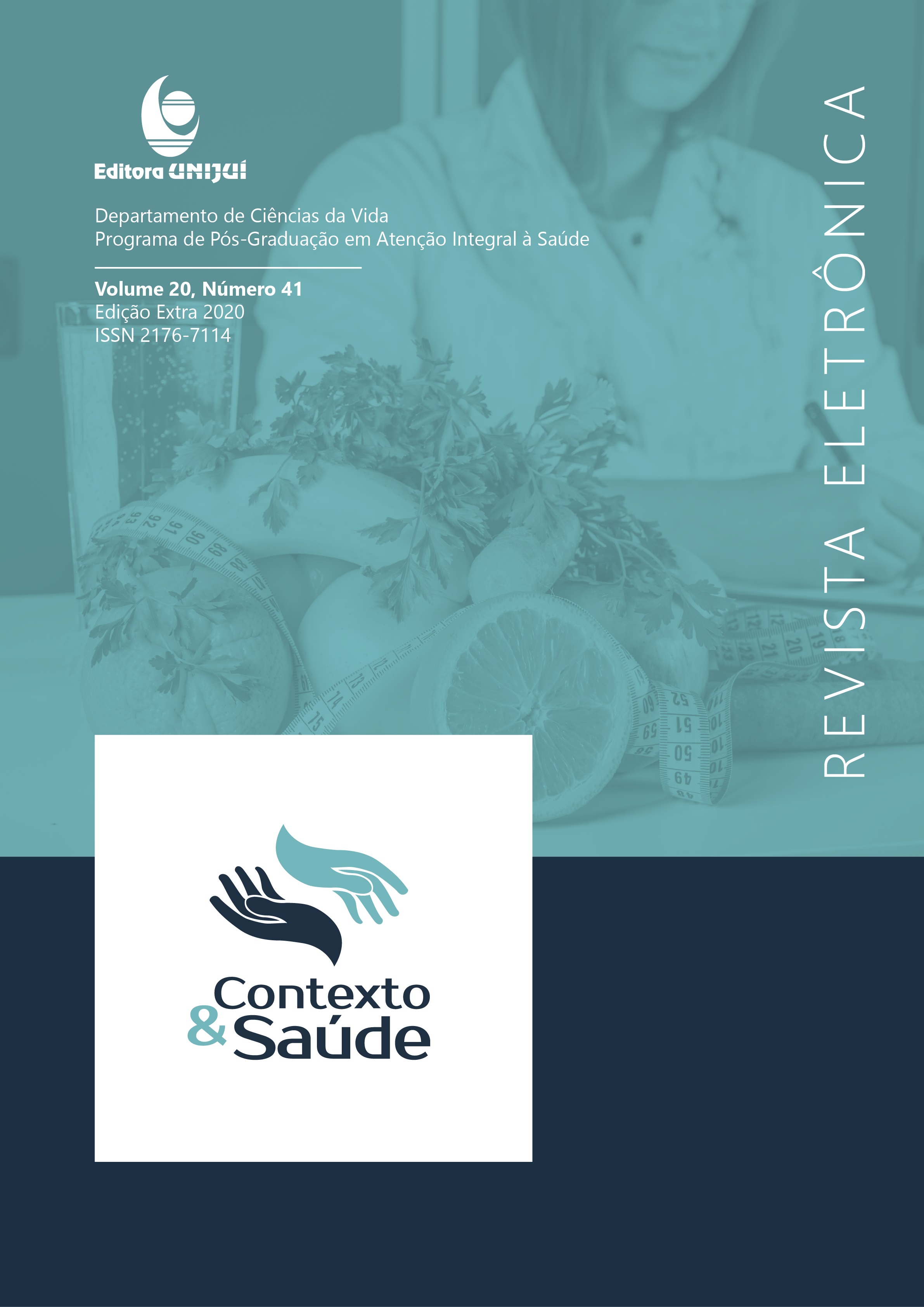ESTADO NUTRICIONAL DE IDOSOS RESIDENTES EM INSTITUIÇÃO GERIÁTRICA E A RELAÇÃO COM O CONSUMO ALIMENTAR
DOI:
https://doi.org/10.21527/2176-7114.2020.41.25-35Palabras clave:
Nutrição do idoso., Saúde do Idoso Institucionalizado., Ingestão Alimentar de Idosos.Resumen
Objetivo: avaliar o estado nutricional e o consumo alimentar de idosos institucionalizados, verificando-se possíveis relações entre eles. Metodologia: tratou-se de um estudo transversal descritivo com abordagem quantitativa, envolvendo 48 idosos. Foi avaliado peso (P), altura (A), índice de massa corporal (IMC), circunferências do braço (CB), panturrilha (CP) e cintura (CC), dobra cutânea do tríceps (DCT), e circunferência muscular do braço (CMB). O recordatório alimentar de 24h de três dias (R24h) foi utilizado para análise do consumo alimentar. A correlação de Spearman foi aplicada para verificar a relação entre antropometria e consumo alimentar. Resultados: foi encontrado que a maioria dos idosos estava com sobrepeso, adiposidade abdominal e desnutrição segundo a avaliação da CB e da CMB. A CP estava dentro da normalidade, e a DCT indicou obesidade apenas entre os homens. Encontrou-se consumo insuficiente de fibras, cálcio, vitaminas D e E, enquanto gordura saturada, ferro e proteínas (g/kg) estavam acima da recomendação em ambos os sexos. Houve correlação fraca das variáveis antropométricas com a caloria total, macronutrientes e fibras. Conclusão: pôde-se confirmar o estado nutricional dos idosos institucionalizados, marcado por excesso de peso coexistente com perda muscular, e conclui-se que este esteja relacionado à distribuição dos macronutrientes, principalmente, no que se refere ao percentual de lipídeos e carboidratos. Sugere-se que este quadro esteja agravado pelo sedentarismo dos idosos, uma vez que o consumo aumentado de proteínas não preveniu a perda de massa muscular.
Descargas
Publicado
Cómo citar
Número
Sección
Licencia
Ao publicar na Revista Contexto & Saúde, os autores concordam com os seguintes termos:
Os trabalhos seguem a licença Creative Commons Atribuição 4.0 Internacional (CC BY 4.0), que permite:
Compartilhar — copiar e redistribuir o material em qualquer meio ou formato;
Adaptar — remixar, transformar e criar a partir do material para qualquer fim, inclusive comercial.
Essas permissões são irrevogáveis, desde que respeitados os seguintes termos:
Atribuição — os autores devem ser devidamente creditados, com link para a licença e indicação de eventuais alterações realizadas.
Sem restrições adicionais — não podem ser aplicadas condições legais ou tecnológicas que restrinjam o uso permitido pela licença.
Avisos:
A licença não se aplica a elementos em domínio público ou cobertos por exceções legais.
A licença não garante todos os direitos necessários para usos específicos (ex.: direitos de imagem, privacidade ou morais).
A revista não se responsabiliza pelas opiniões expressas nos artigos, que são de exclusiva responsabilidade dos autores. O Editor, com o apoio do Comitê Editorial, reserva-se o direito de sugerir ou solicitar modificações quando necessário.
Somente serão aceitos artigos científicos originais, com resultados de pesquisas de interesse que não tenham sido publicados nem submetidos simultaneamente a outro periódico com o mesmo objetivo.
A menção a marcas comerciais ou produtos específicos destina-se apenas à identificação, sem qualquer vínculo promocional por parte dos autores ou da revista.
Contrato de Licença (para artigos publicados a partir de setembro/2025): Os autores mantém os direitos autorais sobre seu artigo, e concedem à Revista Contexto & Saúde o direito de primeira publicação.

